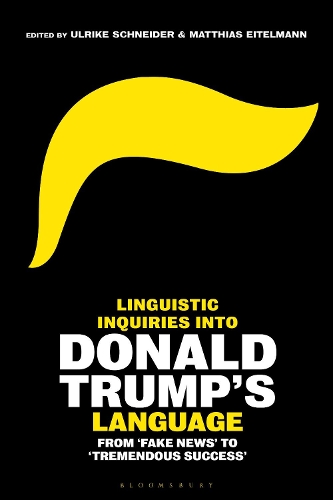
Linguistic Inquiries into Donald Trumps Language: From 'Fake News' to 'Tremendous Success'
(Paperback)
Publishing Details
Linguistic Inquiries into Donald Trumps Language: From 'Fake News' to 'Tremendous Success'
By (Author) Dr Ulrike Schneider
Edited by Dr Matthias Eitelmann
Bloomsbury Publishing PLC
Bloomsbury Academic
21st April 2022
United Kingdom
Classifications
Tertiary Education
Non Fiction
Computational and corpus linguistics
973.933092
Physical Properties
Paperback
272
Width 154mm, Height 234mm, Spine 18mm
420g
Description
From an abundance of intensifiers to frequent repetition and parallelisms, Donald Trumps idiolect is highly distinctive from that of other politicians and previous Presidents of the United States. Combining quantitative and qualitative analyses, this book identifies the characteristic features of Trumps language and argues that his speech style, often sensationalized by the media, differs from the usual political rhetoric on more levels than is immediately apparent. Chapters examine Trumps tweets, inaugural address, political speeches, interviews, and presidential debates, revealing populist language traits that establish his idiolect as a direct reflection of changing social and political norms. The authors scrutinize Trumps conspicuous use of nicknames, the definite article, and conceptual metaphors as strategies of othering and antagonising his opponents. They further shed light on Trumps fake news agenda and his mutation of the conventional political apology which are strategically implemented for a political purpose. Drawing on methods from corpus linguistics, conversation analysis, and critical discourse analysis, this book provides a multifaceted investigation of Trumps language use and addresses essential questions about Trump as a political phenomenon.
Reviews
A timely and most insightful book about the power of language in populist regimes. * LINGUIST List *
The volume offers in-depth descriptions of Trump's linguistic style and discursive strategies ... drawing on both quantitative and qualitative linguistic analyses. The results of the analyses provide nuanced insight into Trump's communicative style and campaign strategy. * Journal of Pragmatics *
It is beyond doubt that this publication makes a timely contribution, with its full potential not only to appeal to researchers and students interested in the specifics of Trump's discourse, but to a much broader audience drawn to the volume's topic. The book represents a well-written and engaging read that is a credit to its contributors; defined by its solid, high-quality investigations ... [it] is the best study of Trump's discursive and communicative sills that can be found today. * Pragmatics and Society *
The papers in this thought-provoking volume explore Donald Trumps distinctive use of language from the perspectives of discourse and corpus studies. They reveal just how marked Trumps language is and suggest potential strategies underpinning it. The book is essential reading for anyone interested in political language or Trumps presidency. * Susan Hunston, Professor of English Language, University of Birmingham, UK *
This is a fascinating book that brings together leading experts from across linguistics to describe and explore Donald Trump's unique style of communication. These studies provide us with a new perspective on how Trump rose to the presidency of the United States and how he has governed since. * Jack Grieve, Professor of Corpus Linguistics, University of Birmingham, UK *
This intriguing collection of investigations into President Trumps language addresses popular (mis-)conceptions about his speech style by exploiting a wide variety of linguistics approaches from corpus linguistics to close reading. It discusses to what extent his idiolect links to political developments of the 21st century. All contributions proceed from media claims about Trumps language with the aim of testing whether these claims withstand vigorous linguistic testing. * Alan Scott Partington, Professor of Linguistics, University of Bologna at Forl, Italy *
Author Bio
Ulrike Schneider is Assistant Professor of English Linguistics at the University of Mainz, Germany. Matthias Eitelmann is Assistant Professor of English Linguistics at the University of Mainz, Germany.
